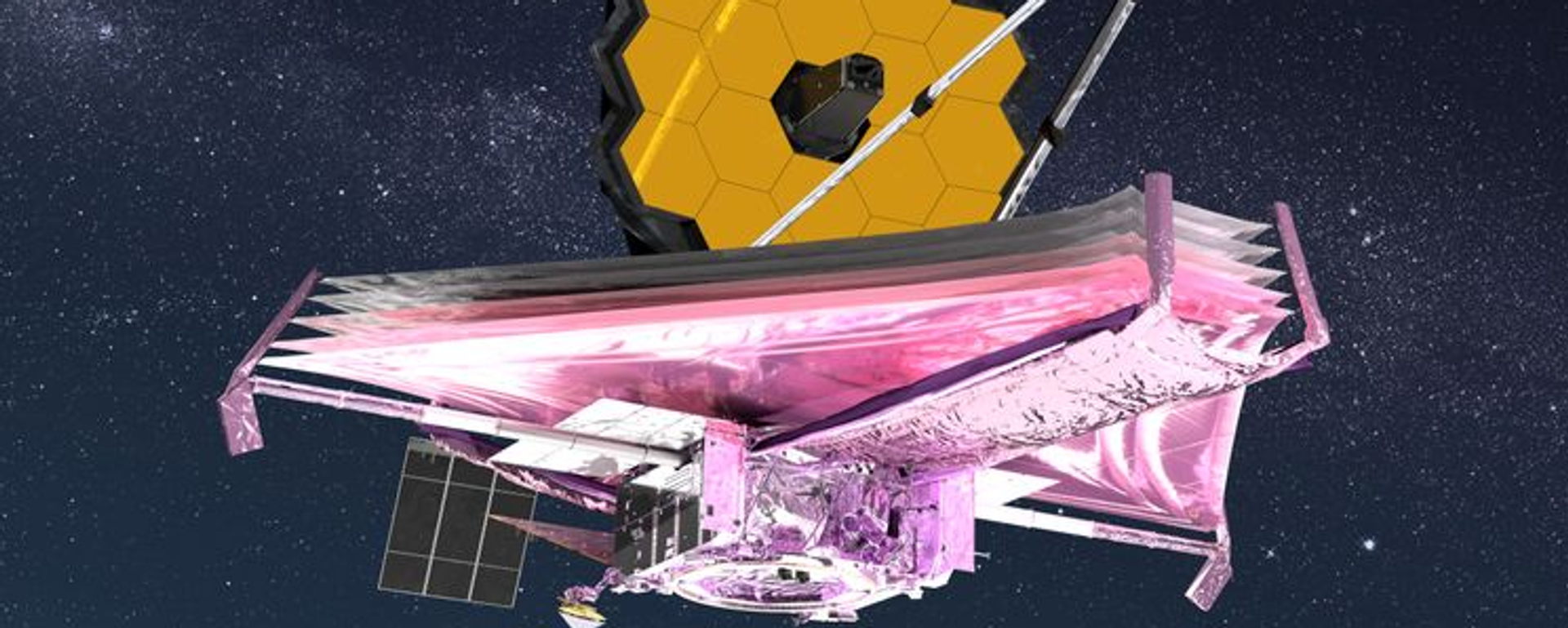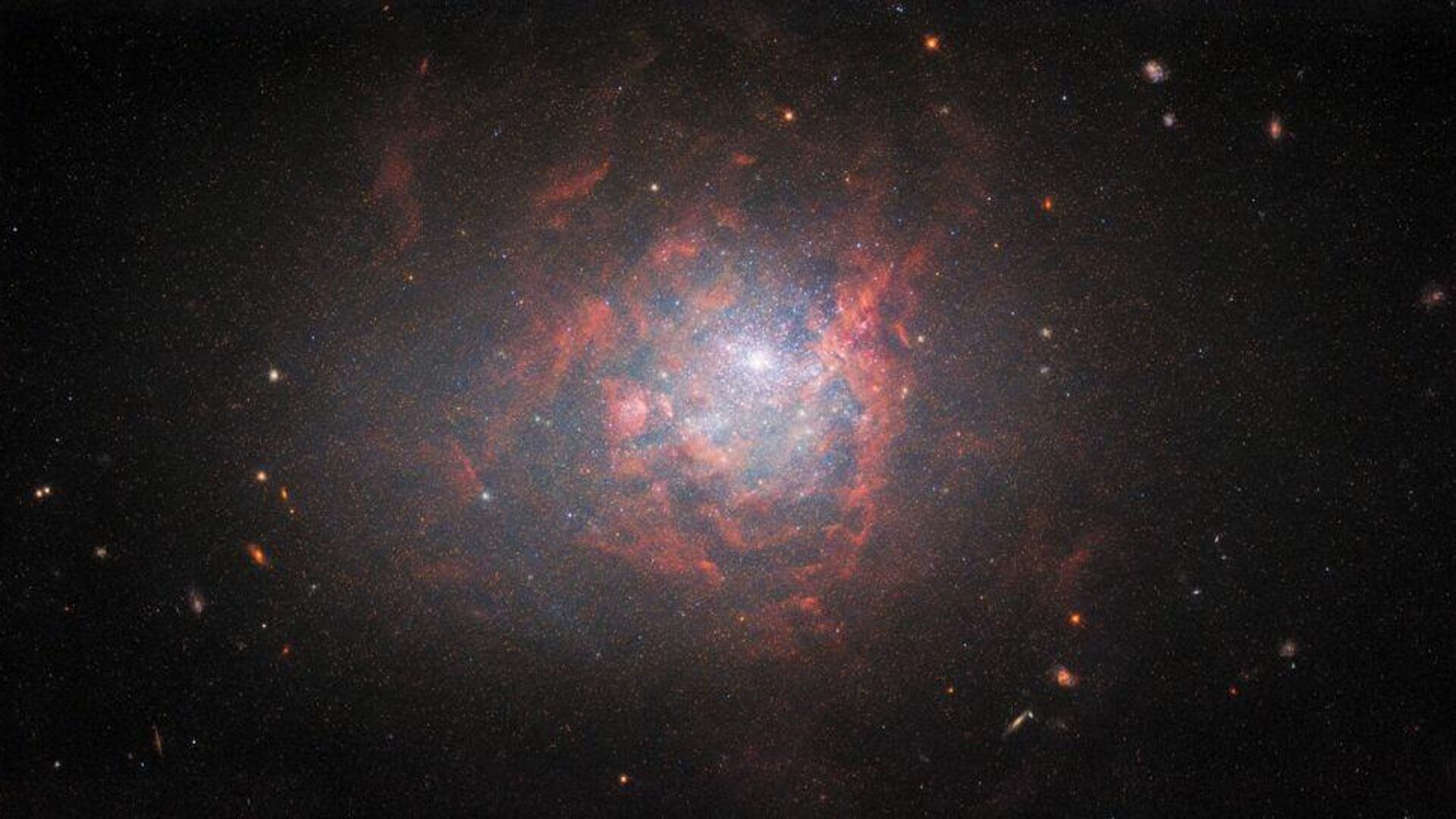https://sputnikglobe.com/20220201/hubble-space-telescope-takes-snap-of-dwarf-galaxy-that-went-through-starburst-1092666375.html
Hubble Space Telescope Takes Snap of Dwarf Galaxy That Went Through 'Starburst'
Hubble Space Telescope Takes Snap of Dwarf Galaxy That Went Through 'Starburst'
Sputnik International
The telescope last checked in on the galaxy in 1999. However, in those days Hubble used equipment inferior to what is installed on it now. 01.02.2022, Sputnik International
2022-02-01T18:37+0000
2022-02-01T18:37+0000
2023-04-12T16:57+0000
galaxy
world
space
https://cdn1.img.sputnikglobe.com/img/07e6/02/01/1092666283_5:0:970:543_1920x0_80_0_0_c483a8774ace723ec416daa6f9014a96.jpg
The Hubble Space Telescope has managed to take an updated photo of the dwarf galaxy NGC 1705, located some 17 million light-years away from Earth in the constellation Pictor.What was notable about the photo is that NGC 1705 went through a "starburst" phase recently (at least from the Earth's perspective). This means that the dwarf galaxy was undergoing the process of unusually rapid star formation, the Space.com online media outlet explained.In the photo, NGC 1705 is surrounded by red cosmic "clouds" and is highlighted by bright starlight.The European Space Agency describes NGC 1705 as a "cosmic oddball". It has an irregular shape, and normally such galaxies have fewer elements than regular ones.The last time Hubble took a picture of NGC 1705 was in 1999. Scientists were studying its galactic centre at the time. The new shot of the galaxy is more detailed due to Hubble having undergone several upgrades since then.Hubble is one of the most advanced telescopes at scientists' disposal. In December 2021, NASA, the European Space Agency, and the Canadian Space Agency (CSA) jointly launched the James Webb Space Telescope, which possesses improved infrared resolution and advanced sensitivity compared to Hubble, which it is eventually expected to replace.
https://sputnikglobe.com/20220125/james-webb-telescope-reaches-final-stable-position-1-million-miles-from-earth---nasa-1092494231.html
Sputnik International
feedback@sputniknews.com
+74956456601
MIA „Rossiya Segodnya“
2022
Tim Korso
https://cdn1.img.sputnikglobe.com/img/07e6/03/0d/1093831826_0:0:216:216_100x100_80_0_0_e3f43a960af0c6c99f7eb8ccbf5f812c.jpg
Tim Korso
https://cdn1.img.sputnikglobe.com/img/07e6/03/0d/1093831826_0:0:216:216_100x100_80_0_0_e3f43a960af0c6c99f7eb8ccbf5f812c.jpg
News
en_EN
Sputnik International
feedback@sputniknews.com
+74956456601
MIA „Rossiya Segodnya“
Sputnik International
feedback@sputniknews.com
+74956456601
MIA „Rossiya Segodnya“
Tim Korso
https://cdn1.img.sputnikglobe.com/img/07e6/03/0d/1093831826_0:0:216:216_100x100_80_0_0_e3f43a960af0c6c99f7eb8ccbf5f812c.jpg
galaxy, space
Hubble Space Telescope Takes Snap of Dwarf Galaxy That Went Through 'Starburst'
18:37 GMT 01.02.2022 (Updated: 16:57 GMT 12.04.2023) The telescope last checked in on the galaxy in 1999. However, in those days Hubble used equipment inferior to what is installed on it now.
The Hubble Space Telescope has managed to take an updated photo of the dwarf galaxy NGC 1705, located some 17 million light-years away from Earth in the constellation Pictor.
What was notable about the photo is that NGC 1705 went through a "starburst" phase recently (at least from the Earth's perspective). This means that the dwarf galaxy was undergoing the process of unusually rapid star formation, the Space.com online media outlet explained.
In the photo, NGC 1705 is surrounded by red cosmic "clouds" and is highlighted by bright starlight.
The European Space Agency describes NGC 1705 as a "cosmic oddball". It has an irregular shape, and normally such galaxies have fewer elements than regular ones.
The last time Hubble took a picture of NGC 1705 was in 1999. Scientists were studying its
galactic centre at the time. The new shot of the galaxy is more detailed due to Hubble having undergone several upgrades since then.

25 January 2022, 00:00 GMT
Hubble is one of the most advanced telescopes at scientists' disposal. In December 2021, NASA, the European Space Agency, and the Canadian Space Agency (CSA) jointly launched the James Webb Space Telescope, which possesses improved infrared resolution and advanced sensitivity compared to Hubble, which it is eventually expected to replace.




